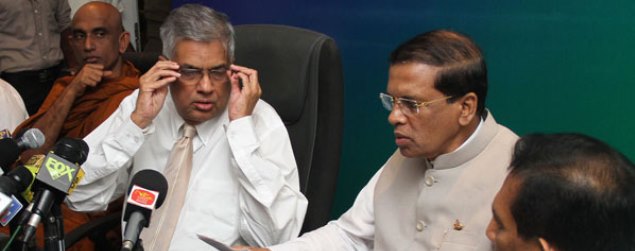[Opposition leader and Common candidate at a press conference; Daily Mirror photo]
By Shihar Aneez-
Dec 23 (Reuters) – Facing possible defeat in his bid for re-election, Sri Lankan President Mahinda Rajapaksa sought to reassure voters on Tuesday that he would resist pressure for an international war crimes probe, bring a new political culture and ensure media freedom.
Rajapaksa’s popularity has eroded in recent years due to public disgruntlement over high prices and allegations of corruption and nepotism, but until recently he had been expected to win an unprecedented third term in the Jan. 8 election.
The emergence of a strong challenger, his former Health Minister Mithripala Sirisena, as the opposition parties’ common candidate last month prompted a series of defections from Rajapaksa’s ruling party.
As more legislators crossed to the opposition on Monday, he lost his two-thirds parliamentary majority, raising the chances that Sirisena will snatch a narrow victory.
Releasing his manifesto, Rajapaksa said that if he won another six-year term he would allow a local probe into possible war crimes committed during the 26-year civil war that ended with the defeat of Tamil Tiger separatists in 2010.
“If human rights were violated, I will establish a mechanism under the existing legal system to ensure justice in a transparent manner,” the manifesto said.
Rajapaksa has faced international censure for alleged human rights violations committed during the final phase of the conflict. However, he has not allowed U.N. officials into the country for a war crimes probe, which many among the island nation’s Sinhala ethnic majority would see as a sell-out.
Echoing many of the pledges already made by his challenger, Rajapaksa’s manifesto also promised good governance, media freedom and a new political culture.
Rajapaksa’s critics say he enjoys excessive powers under a system known as “executive presidency” that has given his family a tight grip on the economy and politics. The president has said he will abolish the additional powers, but he made the same pledge before he was elected in 2005 and 2010.
The latest defections from Rajapaksa’s ruling coalition suggest that Sirisena will narrowly win the presidency, Eurasia Group’s Sasha Riser-Kositsky said in a research note on Monday.
“Incidents of political violence are likely to increase in the immediate run-up to voting as Rajapaksa tries to use security forces to depress opposition turnout,” the report said.
It added that, regardless of which candidate comes to power, the new government will be politically weak and likely to pursue nationalist and populist policies at the expense of economic liberalisation. (Editing by John Chalmers and Jeremy Laurence)
Reuters
